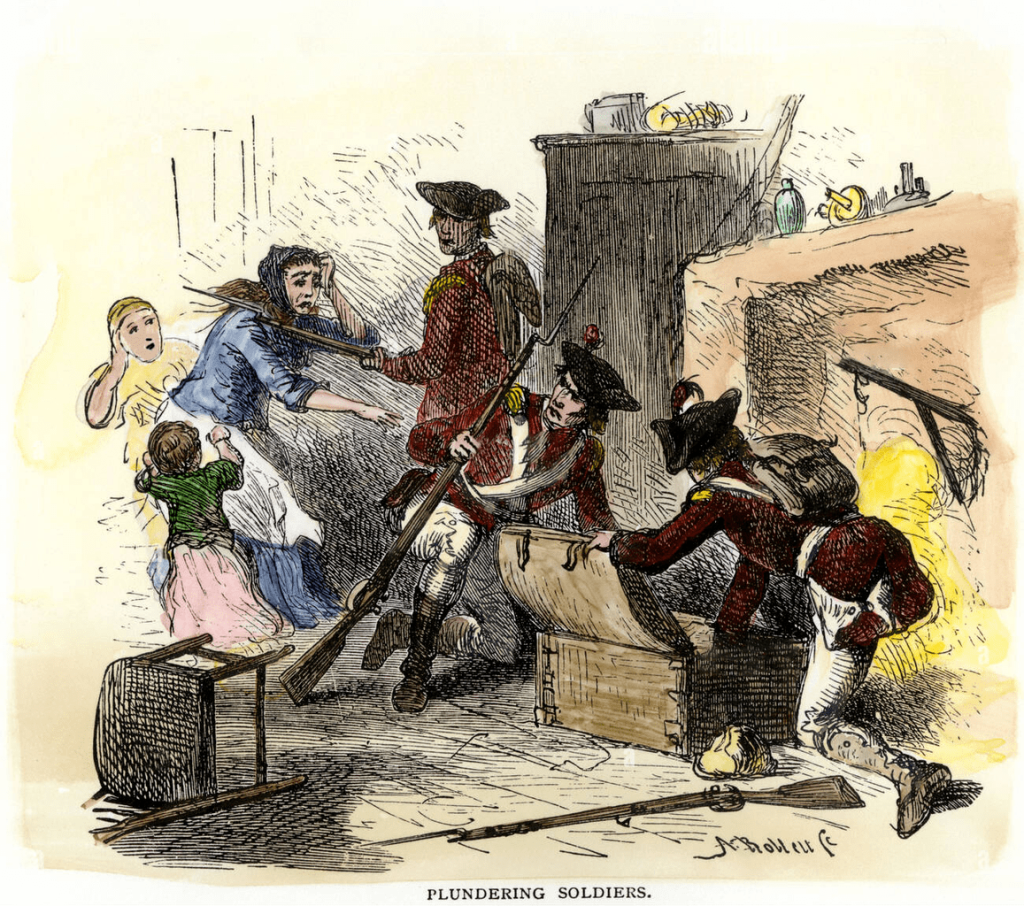Contents
Contents
The Quartering Acts were a series of laws implemented by the British parliament. The laws stated that the Thirteen Colonies in America had to provide housing and other supplies to the British Army, free of charge.
On this page, we’ve summarized the Quartering Acts of 1765 and 1774, and explained their historical context. We’ve also discussed how people in the colonies reacted to the acts.
Summary
In 1763, the French and Indian War ended. This was a war fought in America between the British and French, with various Native American allies on each side of the conflict.
With the war won, the British affirmed their control of the Thirteen Colonies. However, the conflict was very expensive, due to the cost of maintaining the British Army in America.
Therefore, the British began making changes to taxation law in an attempt to raise revenue from their overseas territories, and repay the war debt.
- On April 5 1764, the Sugar Act was implemented, tightening tax controls on the importation of various goods, such as molasses, and also introducing some new taxes on merchants.
- On March 22 1765, the Stamp Act was implemented, introducing a widespread new tax on almost all forms of printed media. This was the first direct tax placed on consumers by the British, and led to widespread outrage, with protesters using the slogan “no taxation without representation”.
The British still needed to raise revenue, and at the time, army officers complained that the cost of maintaining their forces in America was extremely high.
During the war, the colonists provided food and shelter to the British Army to help them defend their land, but after the war was won, most no longer felt the need to do so.
On May 15, 1765, the British parliament passed the Quartering Act. It stated:
- Each of the Thirteen Colonies had to provide housing to British troops on the continent. This typically meant that barracks had to be built, or soldiers had to be housed in other public buildings.
- Each of the Thirteen Colonies had to provide other basic necessities to soldiers, including food, beer/cider/rum, firewood, and other goods.
- The colonies were financially responsible for providing quartering to British soldiers.
In 1774, a new Quartering Act was implemented. The most notable change was that the colonists were now required to house British soldiers on private property in certain situations, which was not permitted under the 1765 version of the act.
The purpose of the Quartering Acts was twofold:
- Help the British Army save money, allowing the government to repay its national debt more quickly.
- Demonstrate that the British had complete control over their colonies – especially the harsher 1774 Quartering Act, which was implemented with a series of other laws known as the Intolerable Acts, in part designed to punish the colonists for acts of rebellion such as the Boston Tea Party.
Reaction

The colonists and their political representatives were outraged by the Quartering Acts.
After the French and Indian War, most people did not see the need to continue stationing large numbers of British soldiers in America.
While quartering measures were viewed as reasonable in wartime, the colonists did not see the continued need to provide free accommodation to the British Army. This, along with the introduction of new laws like the Stamp Act, led to increased hostility between the colonists and British government.
Colonial governments could not afford to provide housing and other supplies to British soldiers without affecting the quality of life of their citizens. After the war ended, most colonies’ economies were struggling, especially as the British began to implement other taxes, such as the Sugar Act.
In response to the Quartering Act of 1765, most colonies simply refused to comply with the law. When a fresh group of British troops arrived in New York in 1766, the governor refused to supply housing.
In response, the British imposed the New York Restraining Act in 1767, which prevented the New York colonial assembly from implementing any new laws until they began to comply with the Quartering Act.
Patriot politicians labeled the Quartering Act unconstitutional, given that it effectively bypassed local governments, directly enforcing demands upon the colonies without their consent. They thought this violated their rights as Englishmen, and was another case of taxation without representation, which they argued was illegal under British common law.
The other effect of the Quartering Act was it led to increased tensions between British soldiers and civilians. This arguably contributed to future instances of violence, such as the Boston Massacre of 1770.
Facts
- The Quartering Act was referenced in the Declaration of Independence, as an example of King George III’s interference with military law.
- During the French and Indian War, soldier quartering was considered a necessary part of the war effort, and it was common for soldiers to stay in private housing.
- Prior to the Quartering Act, soldier quartering was controlled by the Mutiny Act of 1756. It prohibited the use of private housing by British soldiers, but this part of the law was often ignored.
- The Quartering Act of 1774 did not state that colonists must house soldiers in their own homes, which is a common misconception. Instead, it stated that soldiers could live in unoccupied buildings on private land.
- The Quartering Act was not limited to America – the British implemented similar laws in other overseas colonies, such as under the Irish Mutiny Act in Ireland.
- The Quartering Acts were not repealed, as the laws automatically expired within two years. The 1765 Quartering Act expired in 1767, and the 1774 Quartering Act expired in 1776.

